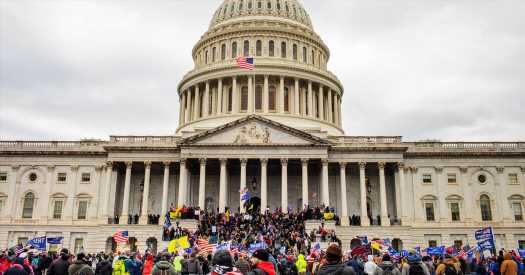Influential conservative voices have spread an unfounded theory, relying on a misinterpretation of legal terminology, that the F.B.I. organized the Jan. 6 siege on the Capitol.
The Fox News host Tucker Carlson, citing the work of the right-wing website Revolver News, speculated about the government’s involvement on his show on Tuesday. Clips of Mr. Carlson’s argument have circulated widely on social media this week, accumulating millions of views and getting shared by Republican members of Congress like Representative Matt Gaetz of Florida and Representative Marjorie Taylor Greene of Georgia.
“Strangely, some people who participated in the riot haven’t been charged,” Mr. Carlson said. “Look at the documents. The government calls these people ‘unindicted co-conspirators.’ What does that mean? It means that in potentially every case, they’re F.B.I. operatives.”
The Justice Department did not respond to a request for comment. But legal experts said this speculation was illogical and far-fetched. Conspiracy is defined as an agreement between two or more people to commit a crime. An undercover federal agent or informant cannot be counted as a conspirator because those operatives do not actually intend to carry out the crime, the Congressional Research Service — the nonpartisan research agency for Congress — explains.
Jesse Norris, a criminal justice professor at the State University of New York at Fredonia who spent several years researching incidents of entrapment in terrorism prosecutions, said he had never come across a case where an F.B.I. informant was referred to as an “unindicted co-conspirator.”
“Legally, it wouldn’t make sense to call informants co-conspirators,” he said. “If they were authorized by the F.B.I. to participate in the conspiracy then they wouldn’t actually be conspirators, because they didn’t have the intent to commit a crime. Instead, they were pretending to commit a crime on the government’s behalf to catch real criminals.”
Ira P. Robbins, a law professor at American University who has written about unindicted co-conspirators, said calling an informant a co-conspirator would make no sense unless an F.B.I. agent had gone rogue.
“Even if that were true, to say that it’s true in one case so it’s true in every case — where’s the evidence?” he said. “Where are the facts?”
There are several reasons the government refers to someone as an “unindicted co-conspirator.” The co-conspirator may have cooperated with law enforcement and received a deal, or there may be insufficient evidence to bring charges against the individual.
In fact, it is the Justice Department’s policy to not name unindicted co-conspirators “in the absence of some significant justification.” (Former President Richard Nixon was famously named as an unindicted co-conspirator by a grand jury in the Watergate case, while former President Donald J. Trump was effectively labeled one in a campaign finance violations case.)
Mr. Carlson pointed to the indictment of Thomas Edward Caldwell, a 65-year-old Virginia resident whom charging documents described as an apparent leader of the far-right Oath Keepers group. Mr. Carlson claimed that unnamed persons mentioned in his indictment were “almost certainly working for the F.B.I.”
The indictment does mention multiple unnamed people. One of them — “Person 1” — is described in the charging documents as the leader of the Oath Keepers, widely known to be Stewart Rhodes. But there is no evidence Mr. Rhodes is an F.B.I. informant.
The charging documents describe “Person 2” taking selfies with Mr. Caldwell together at the Capitol. As the Washington Post reported, that person may refer to Mr. Caldwell’s wife. Mr. Caldwell posted a photo of himself and his wife at the Capitol on Jan. 6.
Mr. Carlson also noted that a plot to kidnap Gov. Gretchen Whitmer of Michigan last year involved F.B.I. operatives. That is true. But the operatives are not listed as “unindicted co-conspirators.” Rather, the criminal complaint refers to “confidential human sources” and “undercover employees.”
Similarly, in the Capitol riot cases, F.B.I. informants were described as “confidential source,” “confidential human source” or simply “informant,” while agents were described as “acting in an undercover capacity.”
And Mr. Carlson cited potential entrapment cases in terrorism prosecutions documented in the book “The Terror Factory” by the journalist Trevor Aaronson, adding, “That’s what we’re seeing now.”
This, too, is unlikely, experts said. In a recent study, Dr. Norris found that “right-wing cases have significantly fewer entrapment indicators” than those involving left-wing or jihadist terrorism cases.
“Not all undercover operations involve entrapment; probably, most do not,” Dr. Norris said.
Professor Robbins said that if F.B.I. agents were heavily involved in planning the attack, it would count as entrapment. But he said he was unaware of any Capitol riot participants raising entrapment as a defense.
“Tucker Carlson takes a great leap of faith here when he says that F.B.I. agents were involved, therefore they were operatives therefore they organized it,” he said. “There’s just no evidence of that.”
Source: Read Full Article
